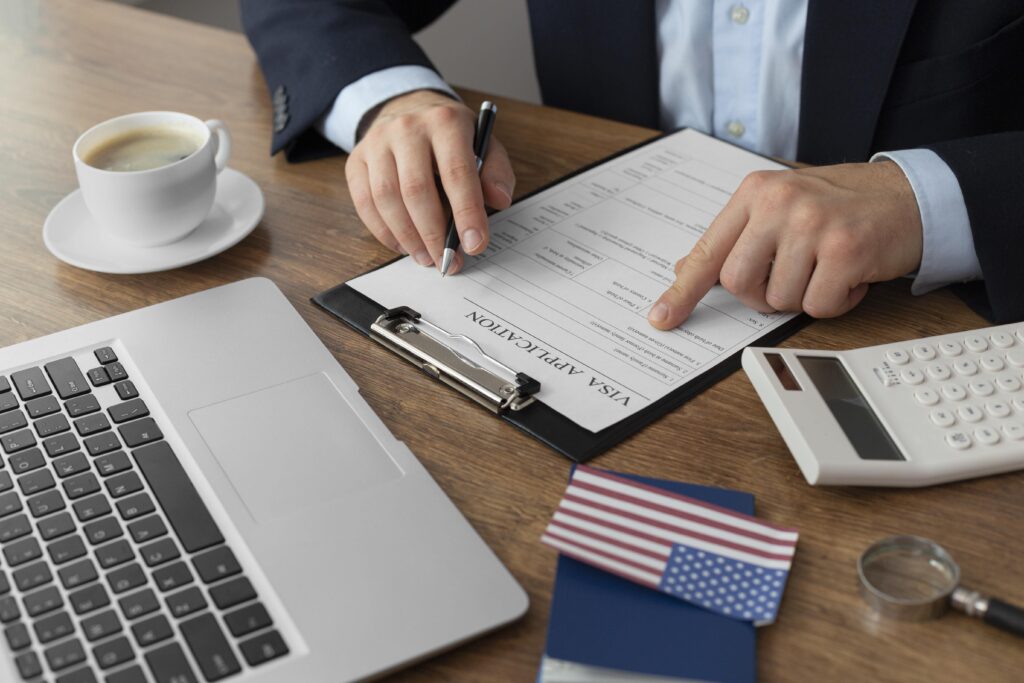How to Obtain a Trade License in Dubai: A Detailed Process
Home » How to Obtain a Trade License in Dubai: A Detailed Process
To open a company in Dubai, you must obtain a trade license, which is a MUST! Dubai’s Department of Economy and Tourism (DET), which authorizes businesses to operate in Dubai, has categorized each business under a distinct license, assigning them prominence based on their commercial activities. Know more about Dubai’s trade license, major types, and its benefits in the blog ‘How to Obtain a Trade License in Dubai: A Detailed Process’.

Trade License in Dubai – A Quick Overview
Dubai’s trade licensing system controls and legitimizes businesses within its territory. Starting a cafe or launching a multinational company requires a trade license, which is non-negotiable.
According to recent reports, Dubai attracted over 72,000 new business registrations in 2023 alone, a testament to its booming economy. More than just a piece of paper, a trade license is a door to one of the world’s fastest-growing markets. A trade license assures compliance with local laws and increases your credibility in the eyes of customers and stakeholders.
Did you know that businesses with trade licenses enjoy special benefits, including placement in government tenders and issuing UAE residency visas? Yes! Therefore, having a trade license is not a luxury anymore; it’s a necessity.
In 2023, His Highness Sheikh Mohammed bin Rashid Al Maktoum established three new subsidiaries under Dubai’s Department of Economy and Tourism (DET) to enhance economic growth:
Dubai Corporation for Consumer Protection and Fair Trade (Law No. 5): Focuses on fair trade, consumer rights, market stability, and promoting justice and competition.
Dubai Business Licence Corporation (DBLC) (Law No. 6): Strengthens Dubai’s commercial hub status by streamlining licensing, enhancing investor journeys, and regulating economic activities across the emirate, including free zones.
Dubai Economic Development Corporation (DEDC) (Law No. 7): Aims to boost Dubai’s global competitiveness, attract investments, and advance innovation, technology, and the green economy.
These organizations align with the Dubai Economic Agenda D33, targeting economic growth, innovation, and sustainable development while positioning Dubai as a global business and investment destination.
The Dubai Business Licence Corporation (DBLC) simplifies licensing by streamlining procedures for business establishments, enhancing the investor journey, and creating policies for registering and licensing economic activities. It ensures compliance across free zones and promotes a seamless business environment, making Dubai more attractive to global investors.
The Dubai Economic Development Corporation (DEDC) focuses on boosting Dubai’s economic competitiveness by diversifying the economy, attracting foreign investments, and advancing innovation and technology. It identifies growth sectors, proposes development initiatives, and strengthens Dubai’s position as a global hub for digital and green economies.
The Dubai Corporation for Consumer Protection and Fair Trade promotes fairness and competition by safeguarding consumer rights, regulating economic practices, and addressing complaints. It ensures transparency in the market, protects intellectual property rights, and enhances economic stability through fair trade policies.
These entities collectively simplify business processes, safeguard consumer interests, and drive sustainable growth, aligning with the Dubai Economic Agenda D33 to position Dubai as a leading global business and innovation destination.

Different Categories of Trade Licenses in Dubai
Dubai offers various types of trade licenses, which caters to its diverse business ecosystem. Here are the primary categories:
1. Commercial License
- Perfect for businesses involved in trading goods or services, such as retail stores and import/export firms.
- Includes such activities as general trading, real estate agency, and logistics.
- Regularly chosen by e-commerce establishments because of the booming online shopping market in Dubai.
2. Industrial License
- Needed for any manufacturing or industrial operation.
- Activities permitted cover factories, production units, and packaging houses.
- These licenses are extremely important to companies intending to set up medium and large-scale operations in industrial zones.
3. Professional License
- Designed for service-oriented businesses like consultancies, freelancers, and IT services.
- Allows 100% ownership for expats in certain cases.
- Includes activities like legal services, marketing, and design.
4. Tourism License
- Designed especially for businesses in the travel and hospitality industry.
- Essential for travel agencies, tour operators, and hotel management firms.
- Aligns with Dubai’s strong vision of being the most preferred global tourism hub.
How to Secure a Trade License in Dubai – The Step-by-Step Process
Step 1: Decide Your Business Activity
Begin by identifying your business activity, whether it’s trading, consulting, or manufacturing. Dubai’s Department of Economy and Tourism (DET) offers a list of approved activities, and some may require additional permits or approvals. Planning ahead ensures a smoother licensing process.
Step 2: Choose a Suitable Business Name
Select a trade name that aligns with UAE cultural guidelines, avoiding references to religion or politics. Ensure the name is unique and reserve it through the DED portal to avoid delays. A distinct, compliant name helps streamline the registration process.
Step 3: Pick Your Business Location
Choose a location that suits your business model. Mainland companies can operate across the UAE but may need a local sponsor, while free zones offer 100% foreign ownership and tax benefits, restricting operations within the zone. Offshore setups focus on international trading and require no physical office in Dubai.
Step 4: Get the Necessary Approvals
Secure required permissions based on your business activity. For instance, healthcare businesses need Dubai Health Authority (DHA) approval, and educational institutions require Knowledge and Human Development Authority (KHDA) clearance. Obtaining these early avoids licensing interruptions.
Step 5: Submit Your Application
Submit your application to DET or the relevant free zone authority, ensuring all documents are complete and accurate. Online submissions simplify the process, but errors can cause delays, so double-check everything before applying.
Step 6: Pay the Required Fees
License fees vary based on your business activity and jurisdiction. Free zones often offer cost-saving packages, including office space, visa quotas, and other services. Factor in both setup and operational costs when budgeting.
Trade License Renewal
The Dubai’s Department of Economy and Tourism (DET) oversees the mandatory process of trade license renewal for businesses operating on the Dubai mainland. To maintain legal compliance and ensure uninterrupted business activities, companies are required to submit the necessary documents and pay the renewal fee annually. Failure to renew a trade license on time can lead to severe consequences, including financial penalties, legal actions, and operational disruptions. Additionally, businesses may face reputation damage, blacklisting, and ineligibility for government services, all of which can significantly impact their operations and future opportunities in Dubai.
Renewing a trade license involves a straightforward procedure to stay compliant with DET regulations. The process includes confirming the license expiration date, gathering required documents such as a valid Ejari certificate, tenancy contract, and BR/1 form, and submitting the renewal application through DET’s online portal, mobile app, or service centers. After submission, businesses must pay the renewal fees, which vary based on the business type and location. Upon completing these steps and meeting all requirements, the DET issues the renewed trade license, ensuring the business continues operating legally and efficiently in Dubai.
Essential Documents for Trade License Applications
You can’t skip the paperwork when applying for a trade license, you need:
- Application Form – Filled and signed.
- Business Name Approval Certificate – Issued by the DET.
- Memorandum of Association (MOA) – For partnerships.
- Tenancy Contract – Proof of your business address.
- Approvals from Regulatory Bodies – If required for your activity.
- Passport Copies – Of all shareholders and partners as well.
- No Objection Certificate (NOC) – If a partner is a UAE resident, currently.
- Initial Approval Certificate – Confirming your business activity is permissible.
Organize your documents in a digital format for quick submission and easy retrieval.
Benefits of Having a Dubai Trade License
Getting a trade license in Dubai opens up a world of opportunities. Here’s why company registration in UAE is worth the effort:
Access to a Global Market
- Offers connectivity through world-class ports and airports due to its strategic location.
Tax Benefits
- With no corporate or personal income tax, your profits are yours to keep.
- Free zones provide 100% repatriation of profits and capital.
Credibility
- A trade license establishes your business as legitimate and trustworthy in the eyes of customers and investors.
- Enables you to enter into legal contracts and open a corporate bank account.
Networking Opportunities
- Dubai’s active business ecosystem is perfect for connecting with potential partners, suppliers, and clients.
- Participate in global expos, trade fairs, and networking events.



